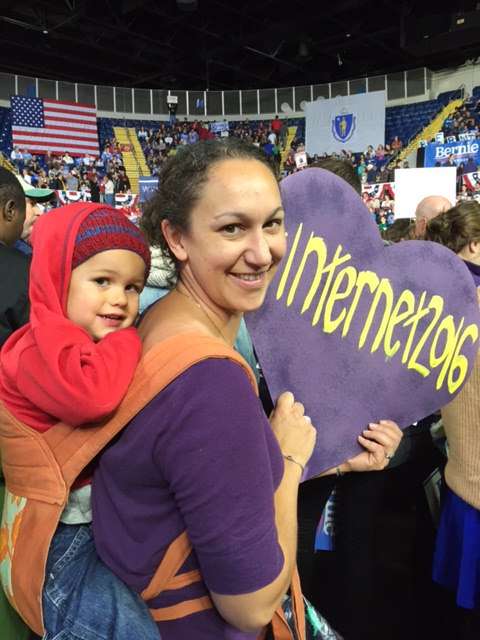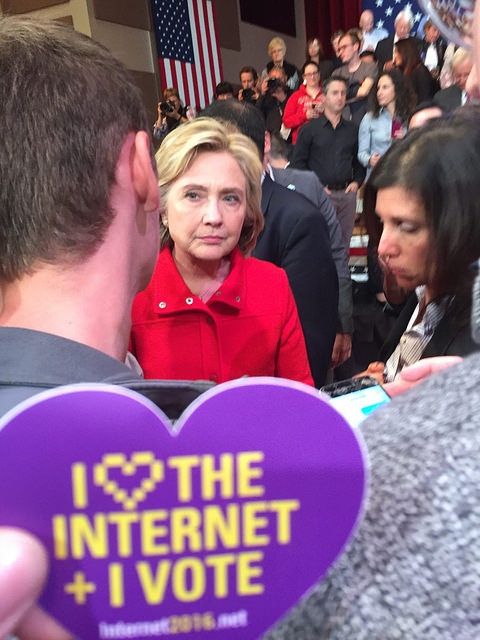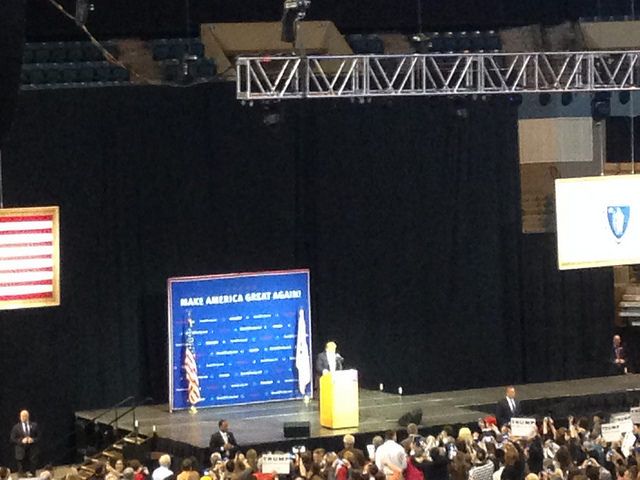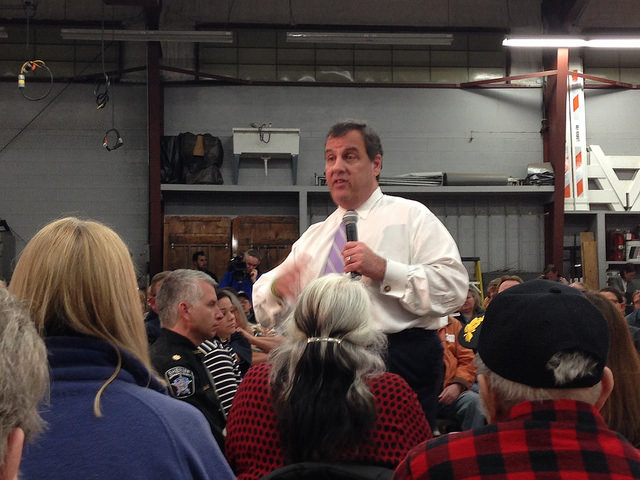Four Months of Bird-Dogging in the Internet 2016 Campaign
by Katherine Fuchs
Dec. 21, 2015
Since launching our Internet 2016 campaign earlier this year, we’ve been demanding that presidential candidates from all parties develop Internet freedom platforms.
We’ve rallied at a few candidate events with signs and stickers promoting the principles of free speech, access, privacy, choice and openness online and asked candidates pointed questions at many more events. This purposeful asking of questions is often called bird-dogging because the questioner flushes information out of candidates in much the same way that dogs flush birds out of brush for hunters.
Here are some highlights of our bird-dogging and visibility work in 2015:
September
Free Press Action Fund CEO Craig Aaron attended a forum on the sharing economy at Civic Hall in New York City. At the forum, Craig had the opportunity to ask Sen. Marco Rubio a question about digital privacy.
Presidential candidate Marco Rubio on privacyHere's presidential candidate Marco Rubio on privacy. Internet voters want to know where the other candidates stand on privacy and other important Internet issues.
Posted by Internet 2016 on Thursday, October 8, 2015
October
Our Massachusetts staff kicked October off with a trip to a Bernie Sanders rally in Springfield. We handed out stickers and held our signs, even getting one of our placards featured on the MassMutual Center Jumbotron. Pictured here is Free Press Action Fund Managing Director Misty Perez Truedson with one of her favorite future #InternetVoters.

Free Press Action Fund Campaign Organizer Katherine Fuchs teamed up with one of our Iowa City members, Trish Nelson, to get Gov. Bobby Jindal on the record explaining his position on mass government surveillance programs. Trish attended our bird-dogging workshop in September and recorded Katherine asking our question as Jindal left a gathering on the outskirts of Iowa City.
Katherine later attended a meet-and-greet with Sen. Ted Cruz in Kalona, Iowa. During the Q&A Katherine asked Cruz about his position on the dangerous Cyber Information Sharing Act (CISA); he said he wasn’t familiar with the legislation. None of the senators running for president showed up to vote on CISA in October.
Oct. 15, 2015: Sen. Ted Cruz on CISAOn Oct. 15. 2015, Sen. Ted Cruz was asked about the Cyber Information Sharing Act (CISA) at a presidential candidate townhall event. Watch his response.
Posted by Internet 2016 on Wednesday, October 21, 2015
Katherine kept going strong on her October tour through Iowa, attending a Rand Paul rally at Drake University in Des Moines. Sen. Paul didn’t give us a chance to ask a question, but he did spend some of his speech talking about the Fourth Amendment and steps he would take to cut back government surveillance on- and offline. While Paul was outspoken about the need to roll back government surveillance, he still didn’t show up for the CISA vote that happened just a few days later.
Several of our Massachusetts staffers showed at a Hillary Clinton town hall in Keene, New Hampshire. Just four days after this event, Clinton published an Op-Ed in Quartz calling out corporate concentration in several sectors, including the broadband industry. In the same piece, Clinton called for enforcing strong Net Neutrality rules and “preempting state laws that unfairly protect incumbent businesses” — presumably a dig at state bans on municipal broadband.

November
Free Press Action Fund Office Manager Rachel Courtney asked Sen. Marco Rubio about surveillance and digital privacy during a handshake line after a town hall at Rivier College in Nashua, New Hampshire. Rubio claimed the problems with domestic surveillance “have been greatly exaggerated.”
Sen. Marco Rubio: Gov't mass surveillance "not a widespread problem"Republican presidential hopeful, Sen. Marco Rubio says government mass surveillance is "not a widespread problem." Is that why he didn't show up in the Senate to vote against the CISA spying bill?
Posted by Internet 2016 on Thursday, November 5, 2015
The Free Press Action Fund’s Rachel Courtney and Field Director Mary Alice Crim attended a Trump rally in Worcester, Massachusetts. No one from our Internet 2016 team was able to ask a question, but First Amendment issues were front and center throughout the night. Both protesters and the media were confined to pens, ensuring they wouldn’t interact too closely with the Trump team or supporters.

At a VFW post in Franklin, New Hampshire, the Free Press Action Fund’s Mary Alice Crim and Heather Franklin got a chance to ask Jeb Bush about surveillance. Bush said that “There’s a way to balance protection of the homeland and making sure that we’re not snooping on people, American citizens, clearly that’s not the thing to do.” However, Bush didn’t explain how he would achieve these divergent goals.
Jeb Bush in NH answering a Q re: surveillance by fed govt of US citizens. #Internet2016 #internetvoter pic.twitter.com/xPMcUcJhNn
— Heather Franklin (@hfranklin93) November 13, 2015At a town hall held in a fire station In Loudon, New Hampshire, Mary Alice asked Chris Christie about unwarranted surveillance. Christie focused on the “unwarranted” part of our question and insisted that the government isn’t listening in on people’s phone calls.

December
Back in Iowa, Katherine attended a Chris Christie meet-and-greet at a café in the town of Jefferson. Katherine followed up on Mary Alice’s question from earlier in the week, focusing on how Christie would deal with encryption in the context of government surveillance. “The danger to the [encryption] backdoor is still a danger,” Christie said, “but it’s less [than the danger of not conducting surveillance].”
Presidential candidate Chris Christie on encryptionAt a recent campaign stop in Iowa, presidential candidate Chris Christie answered our question on encryption. Internet voters want to know where the other candidates stand on privacy and other important Internet issues.
Posted by Internet 2016 on Friday, December 18, 2015
Heather headed back to New Hampshire for a John Kasich town hall in the town of Claremont. While Heather didn’t get an opportunity to ask Gov. Kasich a question, he did address the encryption debate. Like so many other presidential candidates, Kasich vowed to “get some smart people in a room to hash it out without politics.”
In Waterloo, Iowa, Katherine attended a veterans and military town hall featuring Ben Carson. Katherine didn’t have a chance to ask Dr. Carson her question, but the event’s moderator asked for the candidate’s opinion of the USA Freedom Act, which curbs some surveillance programs. Carson said he wouldn’t “be too upset” about delaying the law’s implementation.
Presidential candidate Ben Carson on metadata collectionWatch presidential candidate Dr. Ben Carson answer a question on metadata collection practices and the USA Freedom Act.
Posted by Internet 2016 on Friday, December 18, 2015
In Cedar Rapids, Iowa, Katherine attended the Iowa Presidential Tech Town Hall featuring Gov. Martin O’Malley and Carly Fiorina. Engine and the Technology Association of Iowa organized the event.
Fiorina focused her remarks from the stage on cybersecurity issues, avoiding taking a position in the encryption debate.
Presidential candidate Carly Fiorini on Net Neutrality and bro...Presidential candidate Carly Fiorina answers questions on Net Neutrality and increasing competition in the broadband market.
Posted by Internet 2016 on Friday, December 18, 2015
After the town hall, Katherine found two opportunities to ask O’Malley about expanding affordable broadband access. First, she asked him how he would expand broadband access in low-income communities. He replied that he would extend initiatives begun under the American Reinvestment and Recovery Act. Later, Katherine asked how O’Malley would increase competition in the broadband market. The governor pointed to his “15 Goals to Rebuild the American Dream,” which include “restore America’s competition and antitrust laws, taking action within one year in office.”
Presidential candidate Martin O'Malley on broadband competition.At a recent campaign stop, presidential candidate Martin O'Malley answered our question on how to increase competition in the broadband market.
Posted by Internet 2016 on Friday, December 18, 2015
Over the past year, the Internet 2016 team has learned a lot about bird-dogging and making our issues visible. Now we’re looking forward to building on this solid foundation to hold candidates’ feet to the fire on Internet freedom topics through next year’s election.
